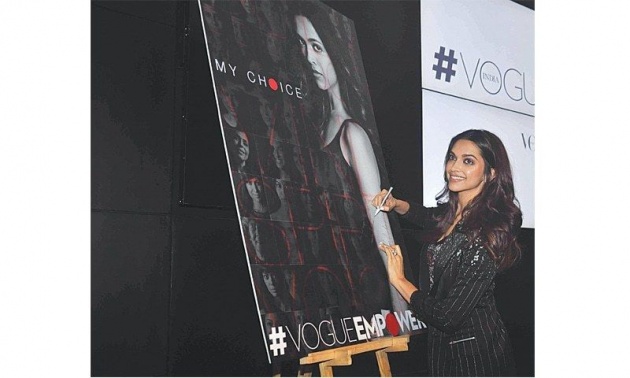
|
Deepika Padukone at the ‘My Choice’ video launch.
|
Bollywood star Deepika Padukone has been making some interesting moves lately that have nothing to do with film-making.
Last year, actress Emma Watson emerged as a worldwide avatar for the modern feminist movement, something that seemed like such a natural fit for the woman who will always be remembered by many as Harry Potter smarty pants Hermione Granger.
Deepika is amplifying the feminist message in a country of 1.2 billion with a video for Vogue India directed by Homi Adajania (who directed Deepika in Finding Fanny and Cocktail). Deepika appears with 98 other women, including film critic and gender equality advocate Anupama Chopra.
In the video, called ‘My Choice,’ Deepika intones, “Your mind is caged, let it free. My body is not, let it be ... My choice: to lust temporarily, or to love forever. My choice: to love a man, or a woman, or both. Remember, you are my choice. I’m not your privilege.”
This is pretty heady stuff, considering that Deepika works in an industry where kissing onscreen is still subject to censorship in her country. She’s speaking openly about queer sexuality and her right to decide to have sex outside of marriage, or not at all. More than anything, ‘My Choice’ is a call to recognise and respect women’s agency.
Deepika has been outspoken about wage equality for actresses and made headlines for criticising the Times of India for objectifying her on social media, but the new video for Vogue India, which has now been viewed more than 4.6 million times, solidifies her commitment to gender equality as her defining issue.
Earlier this year, Deepika took the step to reveal her struggles with depression and anxiety. She was largely applauded for her willingness to discuss a topic that’s still regarded as taboo in many facets of Indian society. Access to mental health care is still very limited in India, with one psychiatrist for every 343,000 people. It’s home to the highest youth suicide rate in the world.
Clearly, Deepika recognises the power of her platform and wants to use it for good.
But with this video, Deepika has waded into more controversial territory. Not everyone found her video empowering. Conservative backlash on social media consisted of chastising Deepika for tacitly endorsing premarital sex. And Quartz India called it “hypocritical”, highlighting the common problems that arise whenever a celebrity starts to delve into feminist issues, especially when backed by a magazine like Vogue, which has its own interests — namely, telling women what to wear, how to accessorise, and crafting and disseminating ideas about how women should look, and how important those looks should be.
The magazine is selling “Vogue Empower” tees and jewellery, with the proceeds going to GiveIndia, an online donation platform that plans to support “women empowerment across India”. So much for specificity.
OK, so this is corporatised feminism, which raises questions about authenticity, and whether celebrities are really the best people to spread the word about gender equality. Deepika, like Watson, is a mainstream film star. Part of her job description is, on some level, upholding conventional standards of beauty, and that made Quartz writer Gunjeet Sra very skeptical:
“Vogue and Deepika have a lot in common: They’re both from an industry that is based on fetishising, objectifying and reinforcing sexist standards of beauty on women. So when these two forces combined talk about women empowerment, one is left a bit confused, because, let’s be honest, fashion and Bollywood do not empower anyone — women most of all.
“The basic problem with the likes of Vogue and Deepika appropriating women’s rights is that, they do nothing for women. They talk about the prerogative of choice, but they don’t explain the burden of those choices. They talk about empowerment when they are themselves slave to consumerism.”
There’s such a big gray area with this because there are more celebrities than ever who seem to be picking up the feminist mantle. So what does that mean, and how important is it? Earlier this year, Cate Blanchett was cheered for dressing down E! when the network’s cameras panned the length of her body at the Screen Actor’s Guild Awards to capture her dress.
Blanchett was talking to Guiliana Rancic when she turned and faced the camera, pointing an accusatory finger.
“Do you do that to the guys ... what do you think that’s going to happen down there that’s so fascinating?” she asked. Momentarily, the internet applauded her for calling out red carpet sexism, because who doesn’t appreciate a chance to attack E! or the insipid nature of red carpet coverage?
But fashion bloggers Tom and Lorenzo were quick to point out, again, that offering a good look at the free gown she was wearing is part of Blanchett’s job:
“Look, we thought the Mani-cam was idiotic. We think it’s appalling to ask female stars questions about their bodies and dietary habits when they’re appearing at a professional event. We even agree that no star should be asked to twirl or lift her skirt to show off her shoes if she finds such things beneath her. But the relationship between fashion and celebrity promotion benefits both sides of that equation.
Cate in particular is someone who has deftly utilised the astonishing array of goods at her disposal (as an attractive, white, sample sized A-list movie star) throughout her career to promote herself and the projects she’s worked on. …
“And there’s nothing wrong with any of that. Good for her for working the system so effectively. But she makes a particularly poor choice to lead any sort of conversation about the shallowness of said system when she continues to benefit from it. How many actresses got a Vogue cover this month to promote their latest movie?”
With celebrities, there’s always a question of where their professional lives end and their personal advocacy begins, and how the former affects the credibility of the latter. “We run into trouble,” Roxane Gay wrote in the Guardian, “When we celebrate celebrity feminism while avoiding the actual work of feminism.”
Which is why Adajania’s decision to include a range of women in the video, and not just Deepika, was a smart one. Deepika’s star power certainly attracts attention, but the issues she’s raising affect women all across India.
Still, Vogue and GiveIndia might want to offer a sharper idea of what they plan to do with the money from Vogue Empower beyond “women’s empowerment”.



